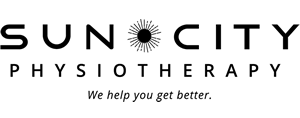Hip osteoarthritis is a common condition that involves the degeneration of the articular cartilage of the hip joint. If you have this condition and are noticing an increase in pain and a decrease in physical function you may be wondering what treatment options are available to you.
With osteoarthritis of the hip you may feel a constant ache localized to the groin and side of your hip and sometimes extending into the front of your thigh and knee. The hip often feels stiff, especially first thing in the morning when you get out of bed and it can make activities of daily living much more painful including standing, walking and stairs. It can also make it difficult to put your socks on, get into and out of your car and even get on and off of the toilet.
Stiffness, pain and having difficulty with many previously easy daily activities may lead you to want to do less physical activity. The trouble is, not moving will often lead to weakness, further stiffness and general deconditioning.
A physiotherapist can help design a treatment program with a focus on decreasing pain, increasing range of motion and flexibility, improving core stability, gaining muscle strength and endurance and improving general conditioning. Other functional goals often include improving walking pattern, speed and distance, ability to go up and down stairs without pain and better control going from sit to stand.
This is often accomplished through a combination of education, manual therapy and exercise. An exercise program is often extremely beneficial to help improve physical function and decrease pain. A physiotherapist is an excellent resource to put together a safe and effective home exercise program for you to perform daily at home or at your local gym. Also, if you enjoy swimming, bring this up with your physiotherapist as aquatic exercise is a great form of treatment for hip osteoarthritis.
Other possible physiotherapy treatments that may be effective for some individuals with arthritis of the hip include: acupuncture, massage, heat on the muscles around the hip, ice, TENS, supportive footwear and/or a gait aid such as a cane or walking poles. It is important to talk with your doctor about your arthritis to discuss other treatments that may be beneficial to help manage your symptoms. Certain medications may be helpful, but it is important to bring this up with your doctor to be sure they are appropriate for you. Also, if you are overweight, a weight management program can be extremely beneficial to decrease the stress on your joints. Since nutrition plays a crucial role in weight management, it is important to have this discussion with your doctor.
A small portion of individuals with hip osteoarthritis will eventually opt to have a total hip replacement. This is often the case when symptoms are progressively getting worse and significantly limiting activities of daily living. If you have had a total hip replacement a physiotherapist guided post-operative hip strengthening program is ideal in order to decrease pain, improve your hip function and return to your active lifestyle.
